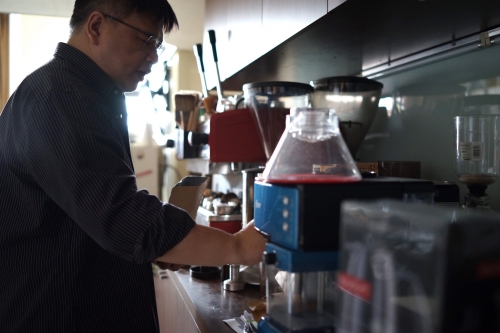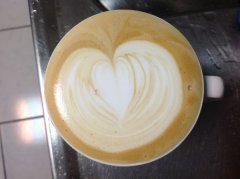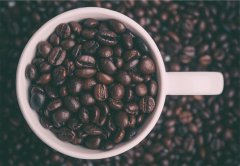Common sense of Italian mixed beans what is Italian mixed beans? The knack of making hand flushing with Italian beans

Professional coffee knowledge exchange more coffee bean information please follow the coffee workshop (Wechat official account cafe_style)
The knowledge of blending coffee beans Italian blending coffee bean formula sharing
For experienced coffee lovers, Cai Ruilin, who is known as "Arnie Da" on the Internet, can be said to be the first classic Chinese book in Espresso Italy Coffee Lab, written with Lin Shiyun. The Coffee Lab coffee lab, which he runs, is still a famous shop where coffee fans must go on a pilgrimage. He, who loves coffee, is also a labor lawyer with warm blood and justice, and is the most solid backing for disadvantaged workers. The interview took place at Arnie's home, and we talked about his coffee life between the company of cute cats and the aroma of coffee.
"my mother loves coffee herself, so I have been no stranger to coffee since I was a child. The negative experience of using a Saifeng kettle in college has kept me away from coffee for a long time. Later, the rise of espresso in Taiwan made me curious about coffee again and wanted to replicate it at home. At that time, the Internet and BBS began to become popular, so I discussed and bought all kinds of equipment on the Internet, and then I saw the discussion of baking coffee beans with popcorn machines in the United States, so I also started popcorn machines and started to try to bake beans, so I planted them in. "
At that time, the Times Publishing House translated the book "the fun of Coffee", which was regarded as a publication in response to the emerging coffee trend in Taiwan at that time, or Arnie's enlightening book. "although later, after an in-depth study, I did not agree with the author's concept of coffee." however, through the introduction in the book, I have tried many different types of coffee machines abroad and have indeed accumulated a lot of experience. " At that time, Arnie discovered: in fact, the focus of coffee is on baking beans, through roasting to stimulate the aroma hidden in the beans, is a completely different world.
At the beginning, raw beans in Taiwan were not easy to buy, and the types were limited to Mantenin, Brazil, Mocha, Colombia, Java, and so on. After Arnie bought them, he baked the beans with a popcorn machine, and then discovered the new world of coffee. There is a new experience different from the previous understanding of the taste of coffee. "I have to say that baking your own coffee beans is definitely one of the keys to your growth in the coffee field, so I understand that there were many mysteries before the second explosion of coffee roasting. The taste is so wonderful that it may be hard to imagine if you haven't tasted it. Coffee actually hides the aroma and taste of tea." Later, Arnie bought manor beans from abroad through the Internet, which greatly expanded his taste bud experience. "I understand that in addition to shallow roasting, you can also see the customs and customs of different producing areas in Specialty Coffee (boutique coffee)."
Next, let Arnie take us quickly into the world of coffee with eight questions.
Q1: what is the definition of "Specialty Coffee / boutique coffee"?
Arnie: for Specialty Coffee, what do you want to think about relative to what and Special? In fact, the person who proposed the term Specicalty Coffee does not define its relative concept, nor does it have such a saying as Generally coffee. Some people in Taiwan call it "commercial beans", but the production and roasting of boutique coffee are also commercial practices, and the name commercial beans is not enough to explain the difference. So I think the relative term of "boutique coffee" should be called "futures coffee", which is the product of mass production after industrialization. Since coffee is, after all, an agricultural product, mass production carries the risk of instability. In trading, in order to maintain a certain level of quality and risk aversion, only a certain level of quality (for example, 18 mesh as a screening standard), coffee beans with origin and nationality are required, and most of them are traded on futures exchanges.
I believe that in order to distinguish Specialty coffee from it, it emphasized that it could be meticulous to the producing areas or even manors, so it was translated as "manor coffee". This can be proved by the fact that traders of boutique coffee and producers such as coffee farmers or processing plants are "priced at a certain percentage of the futures price". Of course, "futures coffee" is a personal cognition, not an international definition. Only by so explaining can we understand the focus of the so-called "boutique coffee". If we take tea as an example, for foreigners, Taiwan tea is collectively referred to as "Taiwan tea", but local people in Taiwan are not satisfied with this concept, so we will emphasize Alishan tea, pear mountain tea, Nantou fish pond tea, and so on. Similarly, lovers who pursue a higher quality coffee flavor will go to more specific producing areas and even buy raw beans directly from the manor.
I have always believed that roasted coffee is not suitable for international trade, because raw beans only have a life span of about 7-14 days after roasting, even by air transport. Coffee is definitely a product made on the ground, and it is necessary to import raw beans for roasting. Different varieties, local conditions and treatment methods in different producing areas will cause differences in flavor. For example, coffee gardens in Costa Rica do not plant shade trees because of their low clouds and strong shading effect, so the taste is relatively light. In addition, Brazil has vast plains, so it will naturally choose the "solarization method", while Costa Rica, Guatemala and Nicaragua all have high elevations and limited space, so they will adopt the "washing method".
Q2: what is the concept of blending of traditional Italian coffee beans?
Arnie: from trying all kinds of machines, I understand the principle and science of extraction; from baking commercial beans, I feel the charm of shallow baking; when I come into contact with boutique coffee, I see the mystery of the local soil. Mix beans with different characteristics, this is another world, general espresso beans are imported either from Italy or Seattle. I used to buy freshly roasted espresso beans directly from the origin, excluding the time factor of international shipment. to understand the purpose of deep baking. As far as individual coffee is concerned, although the flavor difference brought by the year is not big, these slight differences will be magnified after the beans are synthesized, so the deep roasting can facilitate the control of the quality to obtain the average taste, reduce the flavor difference brought by the year, and it is more durable to store.
In addition to espresso, lattes are mixed with milk and coffee, and the flavor concept is different. Here, the purpose of coffee is to highlight the sweetness of milk, so the objective goal of Latte is that the coffee itself is mellow, and after adding milk, it tastes like cocoa, so a good cafe should have more than two bean recipes, one for brewing espresso and the other for making lattes.
Q3: there are so many ways to brew coffee, why did you choose to study espresso? What are the good extraction criteria for you?
Arnie: the common painful experience of all coffee beginners is that they don't know the objective criteria of coffee, including the flavor of beans, how fine they should be ground, how to cook them, and how long it takes to cook them. The Italian coffee machine provides a very precise standard, the traditional definition, the use of 9 atmospheric pressure, extraction time 25 seconds, brewing 30cc coffee, through the above standards, we can go back to determine the amount of beans, grinding thickness and filling pressure channel to achieve a standard extraction.
As the brewing of the Italian coffee machine will magnify and highlight the characteristics of the coffee flavor, through the standardized brewing of the Italian coffee machine to find out the original flavor of the coffee (although it will be relatively strong), which can be used as a reference for the adjustment of the flavor and methods of other brewing methods. This is the inspiration given to me by the Italian coffee machine. In addition, in addition to the number of seconds, espresso can be used to determine whether the extraction is complete or not, and the cup can be opened immediately when the color of the outflow becomes lighter, which is also one of the advantages.
Q4: so, how should the average person choose an espresso machine?
Arnie: the most direct difference between business and ordinary household machines is the caliber of the cooking head. For Italian coffee machine, the variable of caliber influence is pressure, the same piston pump, used in a coffee machine with a smaller caliber than the standard 58mm, will produce higher pressure, while the same amount of coffee powder is put into a small caliber filter cup, the thickness of pressed powder will increase, in fact, this will produce new factors for extraction, so if the budget permits, it is still the standard caliber of 58mm as the priority choice.
Q5: what do you think is the secret of coffee beans and brewing?
Arnie: the way of cooking is to think about the complementarity of "baking depth of beans" and "collocation of water temperature", "thickness of grinding" and "cooking time", so most enthusiasts choose the depth of bean baking in their favorite cooking way. to put it simply, shallow culture is suitable for higher water temperature to balance sour taste, while deep cultivation requires lower water temperature to suppress bitterness. If soak for a long time, such as "French pressure", take a thicker grinding, the focus is to understand the principle of cooking to think.
I usually use an American coffee machine with a blade electric bean grinder as my alarm clock, set the time, and the sound of the bean grinder will wake me up every morning. When the aroma of the coffee floats out, you will know it's time to get up. You may say that the grinding of this bean chopper is uneven, so I think from the point of view of uneven grinding, increasing the weight of beans to adjust the state of cooking, plus the beans are fresh enough, there will still be good coffee waiting for you to get up.
Q6: what's your favorite kind of coffee?
Arnie: I like Kenya best. In the past, the representative of top coffee was Blue Mountain Coffee, and the flavor was focused on cleanliness, but I think Kenyan flavor is better than Blue Mountain. Kenya and Yegashafi are the varieties I would recommend to coffee beginners. I like the sour taste of coffee, because sour taste is also an important essence of coffee taste, the sour aroma of fruit and the sour and sweet taste of citrus are very charming, which will make the water you drink 1-2 hours after drinking coffee very sweet, and the sweet taste between your throat can be maintained for a long time.
Q7: what is your suggestion for coffee with dessert?
Arnie: the latte goes well with whipped cream cake or pie, and the dessert is sweet and creamy. If the coffee is light, it actually fits well with the sour desserts (such as lemon tower). On the one hand, the acidity of the dessert will reduce the acidity of the coffee, and then there are two different levels of acidity that stimulate the taste buds, which can broaden the taste. If it is sweet, it affects the taste of coffee.
Q8: please recommend a coffee brewing method suitable for office workers.
Arnie: I think the most suitable cooking method for office workers is "French filter kettle". The better the heat preservation effect of the French filter kettle, the better the taste. The French filter kettle with hand grinder is my action cafe. Go to the convenience store to heat water when you want to drink it outside, but the hot water used in instant noodles is usually too hot, so tilt the kettle when heating water, and be careful not to let the hot water come into direct contact with coffee powder. On the plane, after grinding the coffee powder by hand, ask the flight attendant to heat up the hot water for you. When you open it, it is full of fragrance, which is a good way to chat up the beautiful woman next to you, .
The advantage of French filter kettle is that it is suitable for thicker grinding, slightly longer soaking time, and lower requirements for the average degree of grinding, so for shallow beans, a cup of sweet aftertaste in the morning can be maintained until the afternoon. Another cup of sour smell in the afternoon can be maintained into the evening, which is the most healing and most suitable way to enjoy in the office.
.
Important Notice :
前街咖啡 FrontStreet Coffee has moved to new addredd:
FrontStreet Coffee Address: 315,Donghua East Road,GuangZhou
Tel:020 38364473
- Prev

Study on Italian matching beans: why should they be matched? The relationship between the flavor and the formula of Italian coffee beans?
Professional coffee knowledge exchange more coffee bean information please follow the coffee workshop (Wechat official account cafe_style) coffee bean matching knowledge Italian coffee bean formula sharing Italian bean matching beans? Many people like to drink lattes, and I am no exception. When I haven't come into contact with fine coffee, I only like to drink lattes all the time. I only know that lattes are espresso and milk, but I don't know.
- Next

The definition of Italian coffee beans what does Italian blending mean? Is it okay to make mocha pot coffee with Italian style?
Professional coffee knowledge exchange more coffee bean information please follow the coffee workshop (Wechat official account cafe_style) coffee bean matching knowledge Italian coffee bean formula sharing Italian coffee bean is actually a kind of mixed formula beans, most will combine more than three different producing areas of coffee beans to mix, the proportion is also free to change, coffee players can make different changes at any time
Related
- Guji coffee producing area of Guji, Ethiopia: Humbela, Shakiso, Wulaga
- What is the most expensive variety of Qiloso in BOP multi-variety group?
- How to store the coffee beans bought home?
- Why are Yemeni coffee beans so rare now?
- Ethiopian Sidamo all Red Fruit Sun Sun Santa Vini Coffee beans
- SOE is mostly sour? What does it mean? Is it a single bean? what's the difference between it and Italian blending?
- Is Italian coffee beans suitable for making hand-brewed coffee?
- How to choose coffee beans when making cold coffee? What kind of coffee beans are suitable for making cold coffee?
- Just entered the pit to make coffee, what kind of coffee beans should be chosen?
- Can only Japan buy real Blue Mountain Coffee? What are authentic Jamaican Blue Mountain coffee beans?

